#yjh meta
Note
one of the many things i hate orv for is making me be so dependant on yoo joonghyuk getting a happy ending— it's all kim dokja's fault i swear i wish for it so bad. the thought of this man not being able to be at peace and happy in a world where his friends and family are there without the scenarios, makes me mad with a grief i didnt know i was capable of feeling for a 'character' 🥲
(what's also funny is that yoo joonghyuk's happy ending, where his friends and family are happy and well, kim dokja is also there standing besides them. But kim dokja cannot even imagine a world where he can be together with them without 'failing' and atoning. 💀✌️) a happy ending for yoo joonghyuk would be one with you as well kim dokja you fool
aughh anon the entire content of this ask has been on my mind for months. do we have some sort of a mind link be honest. also this will have spoilers for epilogue and side story below
aghh kdj wishing for and working so hard for yjh's happiness truthfully translated into us wishing for the happiness of that sunfish too I'd say. 1863 abandoned lives and worlds existing solely to meet his sponsor and find the reason he exists, which is also linked to said sponsor, made him feel liberated and at peace. a feeling which only kdj, said sponsor, took issue with. his guilt is so huge, so strong, he cannot fathom that yjh will not resent him after having his tragedy be used as someone's sustenance.
after kdj split himself into 51 and 49 in order to atone and sustain the world in which yjh and the rest of kimcom will continue to live, he'd already started imagining how their lives would be. 49 and yjh would search for tls123, 49 would read hsy's novel, 49 would attend ljh's graduation etc. what he didnt count for was kimcom regressing to get him back.
after the group regression, yjh says that his story has already ended now that his reader is no longer there. some time later, astronaut yjh sets on a space journey to spread orv and piece kdj together except that he fully expected to die and the mission to fail because just like kdj had learned to live from him, yjh no longer knows how to live without kdj anymore. in fact before sp and 999 gang save him and biyoo appears yjh fully expects that his -- will be 'death' (as if kdj would allow that smh).
after nearly a hundred years he descends into lhh's worldline. i think most of us know that lhh is 49 kdj's reincarnation by now, what i didnt catch the first time around however was that yjh and lhh met right after lhh considered committing suicide (lee "i have no trauma" hakhyun is a fucking liar) but chickened out in the end
a few thousands more years pass and yjh returns to the 1864th worldline. he talks more, he smiles easier, he no longer cares what his -- will be. and hes let kdj choose for himself whether or not he wants to return. he has been kdj's reader for thousands of years, he Understands what it means to get the will to survive by reading someone's story.
and in the side story he wants to take that choice back. he'll bring kdj back himself. cuz hes obsessed. hsy failed so now is his turn. except that his turn hasnt started yet. so who knows.
anw tldr yeah you cannot divorce kdj from yjh's (happy) ending. if any number yjh hears abt kdj in whatever way shape or form he'll get curious abt him. 41, for example. even after excluding lhh, 41 got curious abt kdj. hsy shows him a happy memory of our yjh which included kdj and 41 fucking collapsed (i become more excited abt the side story the more it progresses) and lost consciousness. it was such a strong memory of kdj and kimcom eating yjh's cooking and kdj saying how he cooks so well and he should bring more beef next time that hsy described it as yjh dying from happiness. yjhs -- is kdj related in one way or another. kdj just has to Get It that yjh cannot be happy without him
127 notes
·
View notes
Text
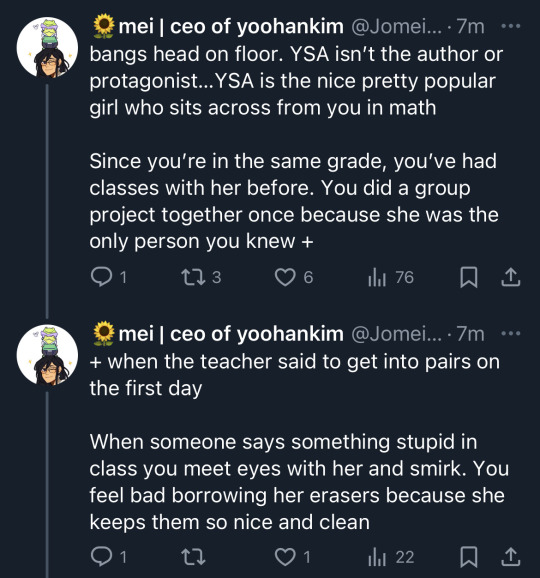
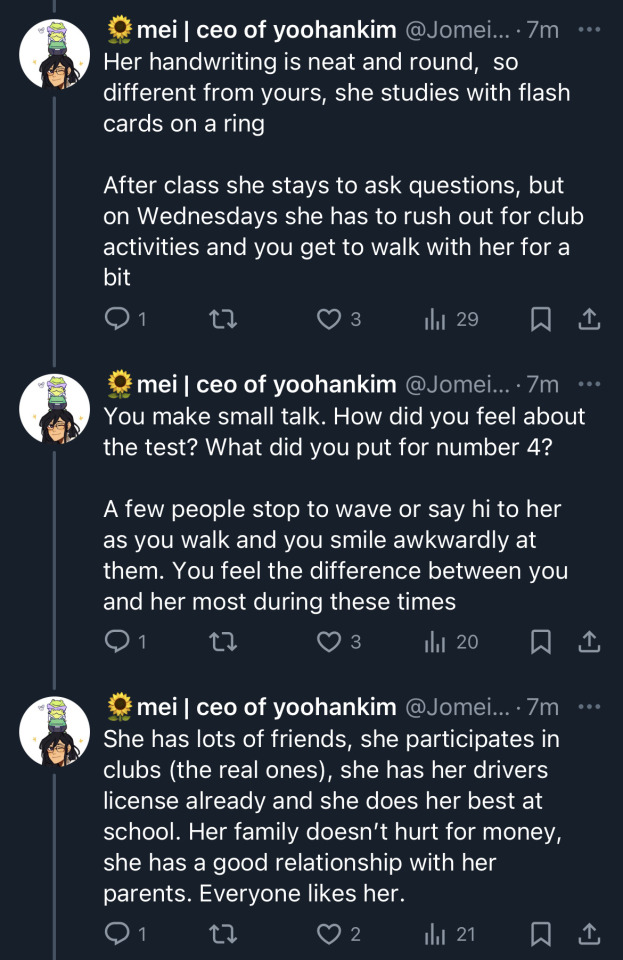
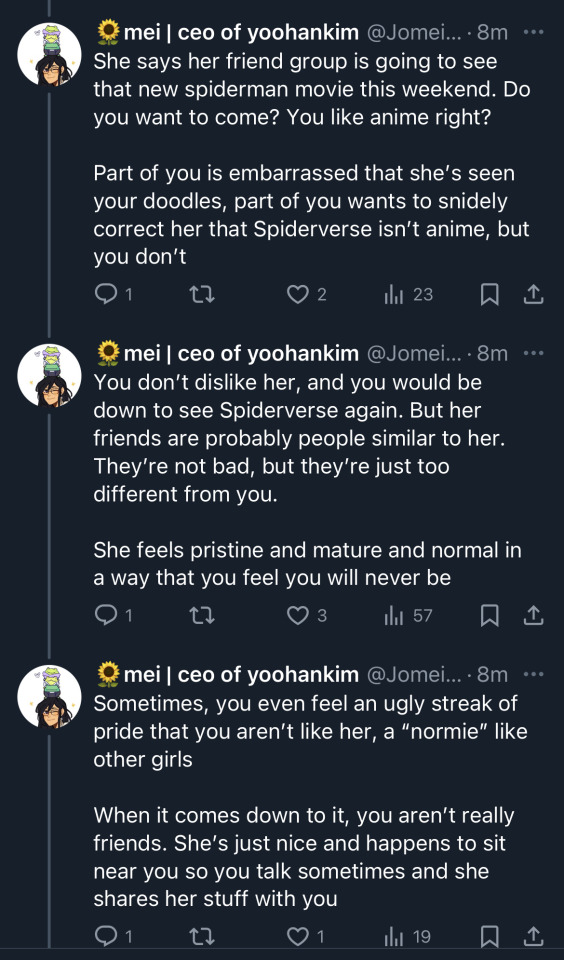
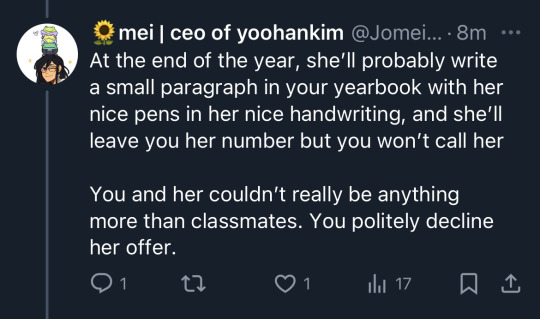
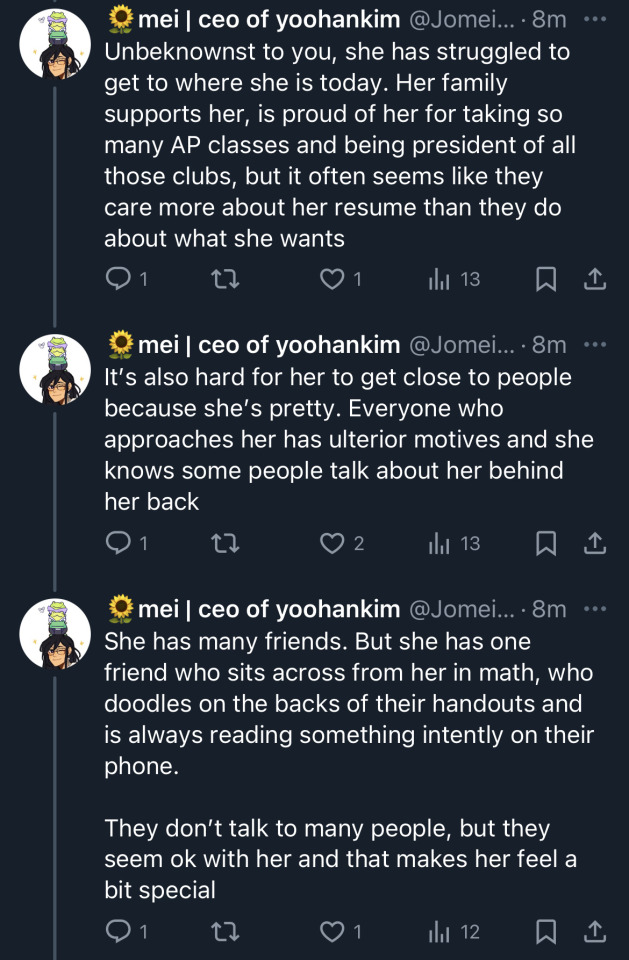
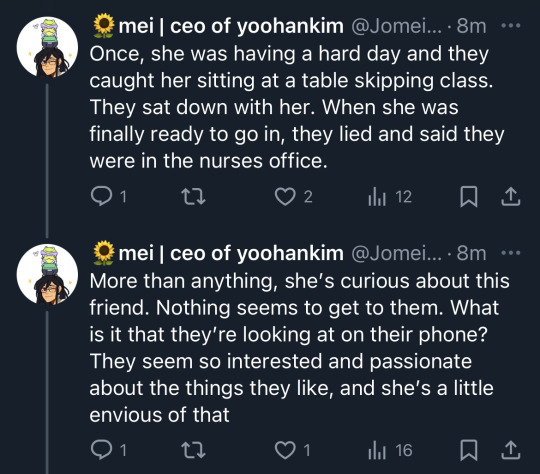
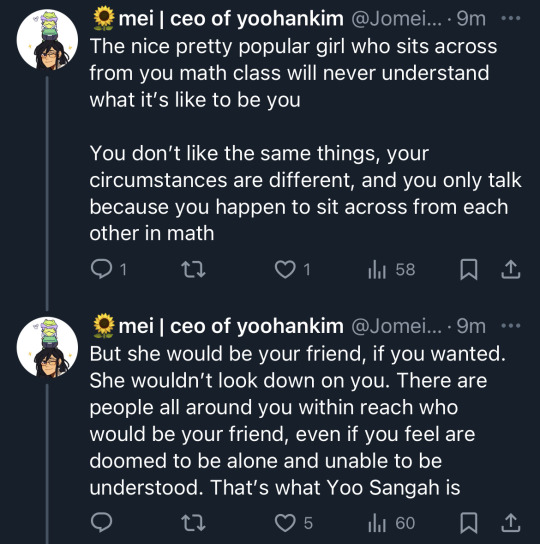
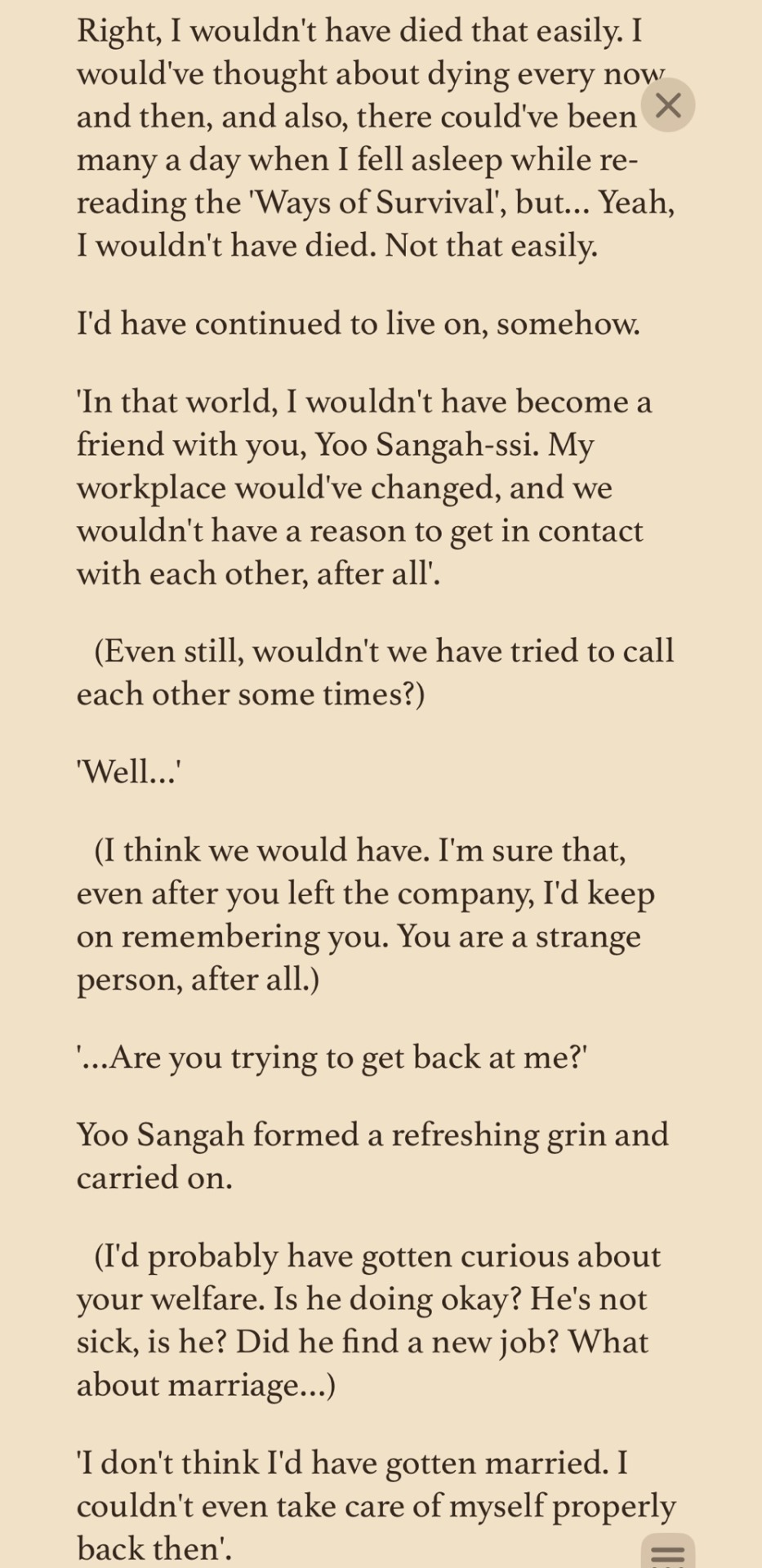
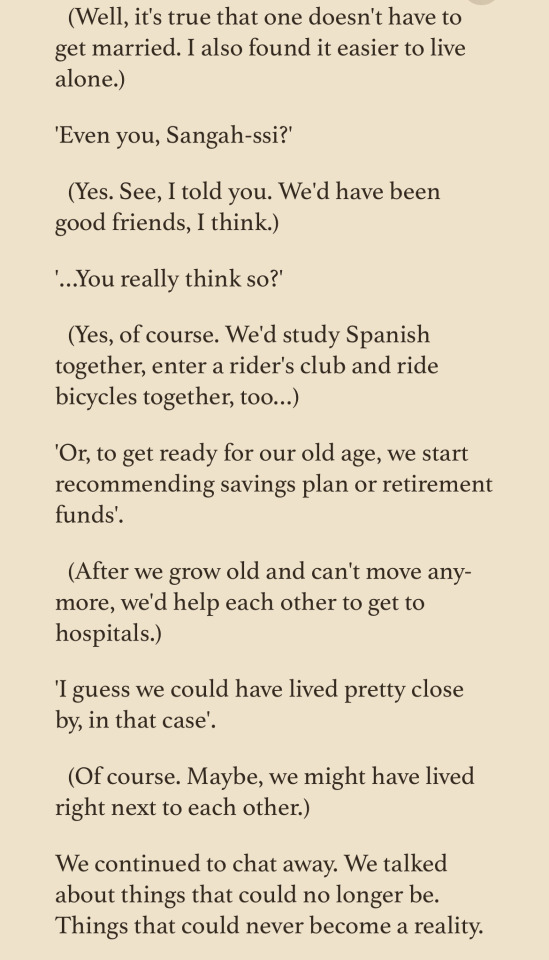
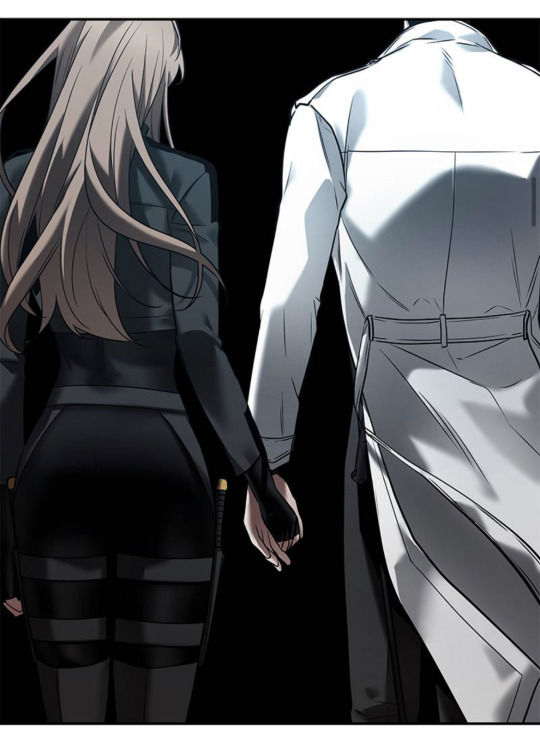
Even if TWSA had finished without the world ending, KDJ would have been okay
#orv#omniscient reader's viewpoint#ysa#kdj#orv meta#Mei talks#bangs head on floor repeatedly. she’ll never understand but she takes his hand anyway. ysa the friend of all time#feeling normal about her#she’s not hsy or yjh#there’s no cosmic fate drawing them together#they won’t meet in every universe#they just happened to do their job interview on the same day. happened to be coworkers#and what a miraculous thing that is#to have a friend
611 notes
·
View notes
Text
Can we talk about the fact that 999th turns’ Lee Hyunsung successfully Secretive Plotter’d himself. Like he became an Outer God and then pretended to be his own past self’s sponsor for a while and nothing bad happened. rip to SP but he's built different
#if i was sp i would kms cuz when HE tried it he accidentally destroyed 999!yjh’s life#while 3rd!lhs and fake master of steel were frolicking n shit. absolutely humiliating for SP#orv spoilers#orv#lee hyunsung#omniscient reader’s viewpoint#sometimes i have thoughts abt lhs. hes an underrated character ok#orv meta#<-maybe#my posts
268 notes
·
View notes
Text
tonight i was thinking about orv’s theme about how yjh as a character, and to a larger extent people, will in some ways always be unknowable. (orv spoilers following, read at your own risk)
i feel like i’ve seen a few posts on here that somewhat take this theme to an extreme, leaning *hard* into that “kdj doesn’t actually know yjh like at all” which while on the right track, i feel completely misses the point. Orv goes out of its way to showcase that kdj actually understands yjh to a scary degree, even once they’re out of the early scenarios and the gap between kdj’s knowledge and yjh’s personhood grows larger, there are still things about yjh that *only* kdj can fundamentally understand. And I don’t think that the novel does anything to discredit that understanding, only says that there is much more to yjh. In the same manner, even if you’ve known someone for years, spent all your time with them, there can and will always be new things for you to learn about them. The danger that orv speaks of is trusting in that assumption, that your understanding will be enough and you don’t have to keep an eye out for more developments. That the person you know will forever stay the same. And this isn’t a kdj problem either, fundamentally a lot of the big disagreements that happen between kdj and yjh in the latter half of the novel are born from both of them misconstruing what the other is thinking, trusting that their understanding of the other is deep enough to base their judgements off of. (Post first murim destruction, divorce arc, yjh thinking kdj scattered his soul on purpose, etc.)
As always with orv’s themes, we can view it in a meta sense as well. Kdj’s understanding of yjh as a character is so complete that it’s nearly flawless- until the story begins to deviate and a yjh grows outside the parameters that kdj’s judgements are based on. Even before then, there was always more to yjh- but as readers, we can only understand a character as much as we see them. What you come away with from a story is your complete understanding, there is no growth outside of those boundaries because then it wouldn’t be an understanding of *that* character, you would be putting your own ideas and such into it. But talk to another person, and suddenly the same character you understand so clearly becomes someone else. Talk to the author, and they say something completely different. And can one truly claim to understand a character when the story will never talk about them in every conceivable way? What does it take to truly understand such a thing? Learning that 1863rd round hsy wrote ways of survival with such limited resources and knowledge on who yjh even is, and yet despite it all, still manages to write a story that captures so much of his essence. As orv readers, we know it isn’t everything- it could never encapsulate all of yjh, but the idea that even when one knows nearly nothing, you can still put on a facade of understanding.
We can get into a chicken or the egg argument with this, as 1863!hsy dictates how yjh acts with her writing, and that yjh in the 1863rd round is the one she comes to know before ever starting this story, but when it comes to this theme of the unknowable in the people around us, I don’t think this sort of debate is worth much. We know that yjh exists outside the story written, and how much of him is determined by hsy’s writing is negligible because no matter what, he always grows beyond it. Whether as 1864 or secretive plotter, it all comes back to that same point of there is always more to see within a person.
I don’t know quite where I want to go with this, only that I wanted an outlet for some of these thoughts inside my head, but one of the best things about this theme for me is how it answers itself. When the people around you become unrecognizable, what should you do? And orv says to reach out. To try. To understand. Kdj loses access to omniscient reader several times but always, always gains it back in orv (as far as i remember), because at the end of the day, he is not someone who stays trapped in his idea of who he knows yjh to be. Yjh too, even at the end of orv, is trying to learn more and more about kdj. Only when you are willing to hear out the other person, to learn about them every day, does this unknowable aspect become something less daunting.
#orv#omniscient reader#omniscient readers viewpoint#kim dokja#yoo joonghyuk#joongdok#meta#analysis#it just kinda ended up kdj and yjh focused because this is what the theme is most applicable too#i wish i had more thoughts on how 1863 wrote WoS bc that definitely fits in here more than what i said about it#i think too it can be applied to ysa and kdj#while not as relevant as it is with yjh since their relationship doesnt stretch back as far#they still spend so much of this novel learning more and more about each other#compared to back at minosoft where at least to me it looked like they already had an idea of who the other was as a person#so sorry if this is disjointed i need to stop writing meta as 3 am#in my defense its the only time my thoughts come out like this#on the verge of sleep#orv spoilers#omniscient reader spoilers#i forgot them early on my bad
586 notes
·
View notes
Text
The fact that the "Yoo Joonghyuk from the 0th turn was willing to go through 1864 regressions solely to see Kim Dokja again" notion is so popular kinda irks me because of how it 1) strips YJH of any nuance in his character by reducing him to a pining lovesick man 2) kinda disregards an arguably more heartfelt reading of the scene
To clarify, I'm not gonna argue that YJH did not consider KDJ in his decision to regress, he evidently did, but it drives me nuts when people act like that's the only reason why YJH regressed.
Now granted, YJH did kinda start this whole conversation with "If I choose you as my Constellation sponsor, will I finally get to meet you?" and so I understand when people think that meeting KDJ face-to-face is the reason why YJH chose to regress despite the slim chances but I also want people to consider one of YJH's enduring characteristics.
YJH has always been portrayed as wanting to know the truth of the world he lived in and wanting to understand his origins. He seeks to reach the conclusion because he wants answers for his suffering and the hardships he went through. Hell, one of the things he says to KDJ during this scene was "Who am I?" and then he goes on to ask whether "the secret of this world lies beyond the wall, where you are?"
YJH of the 0th turn has reached a point in his life where he is happy but he says that it's because of that that he's "even more curious about what lies beyond the wall". He wishes to take the time to understand himself after achieving such happiness and this really feels like an example of someone seeking self-actualisation.
And this also ties into my second point because understanding YJH's (imo) primary motivation ultimately frames this scene as one where two individuals who deeply love each other have to separate because one of them has decided to dedicate their life to a certain goal while the other (reluctantly) accepts their decision because they understand that it would make their loved one fulfilled.
It's a different flavour of bittersweet from the popular reading because what separates them is ultimately YJH's desire to reach self-fulfillment and KDJ accepting his desire even if it he thinks YJH is a "dumb bastard" for doing so.
After spending so much time with YJH, both as a character and as a companion, KDJ understands better than anyone that this is what YJH needs to do. And so he lets him go.
Even if it hurts. Even if he knows that YJH would eventually resent him for it. Even if he thinks regressing will just make him miserable. He lets go because he knows that this is who YJH is and he would be remiss if he let his own personal feelings get in the way of respecting his agency.
And yes, this sucker punching line right here "Tell me, you fool. If I continue to regress, will I ever get to meet you again?" does imply that half of his reason to regress is to meet KDJ irl but! I also wanna point out that KDJ never really confirmed to YJH that he could meet him again. And taking that into consideration alongside YJH's final words to KDJ, "I shall pray that you may continue to exist somewhere too" and that he still didn't stop to second-guess his regression, you're kinda left with the impression that YJH would have still gone on this journey even with the possibility that KDJ may never show up again in the future. He regresses with the small hope that they will meet each other again but he doesn't move forward solely because of that small hope.
I like to think that it's because in the 0th turn, YJH already considers them to be companions and even if he doesn't meet KDJ again, that doesn't mean their bond didn't exist.
Because, as he said about his other companions, "Just because I will forget about them, doesn't mean they'll suddenly stop existing".
Much like how the Demon King of Salvation won't stop existing even if he forgets him.
But like, regardless of whether my interpretation is right or not, I just think that YJH going forward for his own truth rather than just a desire to see KDJ again makes for a sweeter narrative after the bittersweet ending of the 0th turn.
Because as luck would have it, KDJ would once again guide YJH towards the end on his 1864th turn in the future/past, just like how he did during the 0th turn.
Regardless of YJH's personal motivations and KDJ's personal hangups, the two are irrevocably linked and that small hope from seemingly aeons ago finally became reality after countless lives.
Maybe this is why they are called "Life and Death Companions".
#tldr#I think there's a way to interpret this scene without taking away YJH's nuance while still emphasizing Joongdok's connection#maybe one day I will actually be concise in what I'm saying#omniscient reader's viewpoint#orv spoilers#orv novel spoilers#orv analysis#orv meta#yoo joonghyuk#kim dokja#joongdok#-gesturing wildly- as with everything orv‚ it's about the sacrifice and the salvation#The Cloud Talk
907 notes
·
View notes
Text
how come only yoo joonghyuk is called a regressor and not anna croft? anna croft gets her title of prophet through her transporting her memories to her younger/'future' self through the world lines. in essense, this is what yoo joonghyuk does when he regresses. he comes to in a new world line and inhabits his younger-selfs body. so why? i had this question for a while and then i finished the novel and i was like ohhhhhhhh thats why.
you dont have to regress to a be a regressor. to be a regressor, you live in the past, trying to escape the very clutches of your own memories. this is what yoo joonghyuk does- he goes through the scenarios, collecting companions from a time long passed and that only he remembers. he uses his memories to go through scenarios, but eventually this method crushes him because of all the people he's lost and the lives that are still going on but they aren't the ones that he's lost. that's why regression depression hits him so hard, because he is so actively aware of what he's lost and has gone through. from a battle field in the 94th scenario to the very beginning in the train once again. in contrast, anna croft receives everything in a dream. its less real to her, the dreams are a choice that she's made to give forward. and then she chooses to stop giving the dreams forward, because like yoo joonghyuk, she has decided that this turn will be the last. and yet, she is still not a regressor.
#'hello? this is your mother' sound on tiktok but for yjh + the main regression gang#this is a rant if anything#orv#omniscient reader's viewpoint#orv meta#yoo joonghyuk#anna croft#meta#posts
34 notes
·
View notes
Text
ORV transcends language | how ORV is kind to readers (1.1k words)
the difficulties in analyzing text are already numerous without a language barrier, the way one word can mean 5 things and when you put it in a sentence suddenly it can mean 50 things and put that sentence in a paragraph? go further and put that paragraph in a page? construct a whole world around it, weave it into the fabric, and suddenly you are painting with words.
ORV is a daunting text, it calls and references so many mythos world wide, greek, roman, indian, chinese, japanese, it plays with meaning and intent and uses gaps in our knowledge like weapons, making us extrapolate our own meaning between the sentences, it is a tome of knowledge when it comes to histories and philosophies it feels at times like I will never understand all these things inside it.
One of the difficulties of reading a translated text is that when we analyze a text the authorial intent weighs very heavily in our minds, sure we can immerse ourselves in the world but once we start picking apart at the threads we hit a wall pretty soon when we start asking ourselves "what did the author mean by this?" however in a translated text there is an obvious gap, a game of telephone, did the translator actually capture the authors intent? or are we just reading the translators perception?
sadly I don't know korean, and I cant say I have the drive to learn it, as such I know there will forever be a side of ORV that I will never be privy to - however I am bilingual and had the pleasure of reading two translated versions of ORV, an English translation and an Arabic translation, I didn't finish reading the said Arabic translation but a couple things stood out to me when I briefly did
ORV is very kind to readers, following along in other stories can seem confusing at times, the pacing might be too fast and you might miss some details in a characters actions, the wording might be too vague and ah damn 20 pages later you realize you don't actually know why the characters are doing what they are doing. A big writing adage that you will see a lot is "show dont tell" and it holds merit, but ORV doesn't subscribe to it, because ORV shows AND tells.
ORV built a world around readers and reading, and it makes sure that there is clarity every step of the way on what is happening, first by starting out as a homage to the isekai genre, and not deviating too much at the start, making the readers feel at home in a worldview they are familiar with, systems, leveling, videos games etc, and when it starts deviating it explains things with clarity that no matter how bad the translation is you understand the general intent, and secondly by being VERY blatant about the names of things and having a built in "story" system that is built on common story tropes and names the themes for you!
take for example "unbroken faith" and "Blade of faith" both of these are two translated versions of dokja's sword. I will never know which one is closer to the original authorial intent, but I can tell you something, dokja's sword is symbolism to the faith he is wielding.
(CH386 vague spoilers) or the entirety of "the great war of saints and demons" being about the concept of good and evil fighting and how kimcom aren't just above being good and evil, they are both. By using story tropes that we are familiar with to explain the complexity of situations in a simple forms you no longer have to worry about losing you readers understandings through language barriers. Every story in the world in every language knows what good vs evil is, every language has the words to explain them.
and therein lies the beauty of ORV.
But of course this isn't to say translations don't matter, it does speak to the strength of an original texts clarity when it accounts for the big things by making them simplified, but when we get down to the nitty gritty it starts to lose form
take for example
"Tell me, you fool. If I continue to regress, will I ever get to meet you again?"
this person here has a great write up explaining the translators thoughts behind this specific line
but it has spawned a lot of debate in the English speaking fandom, as to the strength of its translation, I remember when I first saw someone claiming that its a mistranslation and "you fool" isn't part of the original, my first thought was "and so?"
I do not mean to be dismissive to the original text, but I do not exist in a space where I can appreciate it in the original korean, I do not exist in a worldview where I can understand the historical implications of a lot of the characters, and even when I try to research it in English sadly the resources do not exist yet and its even more laughable to think of finding these things in Arabic. (Goryeos first sword doesn't have an English wikipedia page as a clear example)
a lot of people have issues with the most popular English fantranslation of ORV - and I can understand why, being bilingual I have a lot of opinions on how a lot of things SHOULD be translated most of the time, and have done my own translation work
but as I sit and think about this popular translation I cant help but just feel love for it, it might be lacking to some, it might be inaccurate at times to others, but its just enough for me to paint the gaps in the text with my perceptions, the words used are tied to my affections
the Arabic translation of ORV is clunky, it is messy, it doesn't have as much grace as the English translation of ORV does, the words barely string together cohesively, but it has enough clarity, enough intent, and enough love for its readers, to catch their hearts, their attention and their energy
and so I want this to be the first post on this blog because, the author is dead here, not because I buried them, but because the tower of babel fell down a long time ago, and all we have is rubble and each other.
a lot of the analysis on this blog will try to be respectful to the korean original wherever it can, however my words will be coming from an anglosphere perspective, and build on other English reader's perceptions of a text translation that a decent amount of people don't think is adequate, but just like ORV is kind to us, we can be kind back, I will quote the most popular version because its what connects us together, and while the authors intent might be lost, we can share our own meanings with each other, and build our own intent from the rubble.
#orv meta#orv#orv analysis#r1864#a big wall of text for me to go lol orv is queer and yjh is trans coded#but this is tumblr so everyone knows that already#also I still don't actually know what naming convention is correct I've seen many discussions about this#I just go with what is most popular for ease of understanding and ease of reading#also i find the naming thing very funny in english and latin letters because there isnt nearly this much drama about it in the arabic scrip#I just assume its like any other language that doesnt use latin and we are just trying to break english to sound out letters they dont have#i do like how dokjas name sounds like its splitting in the middle in the correct pronunciation 'dok-ja' adds to his duality#and i am sad that gets lost in the latin script sounding
97 notes
·
View notes
Text
Okay I can't find the post anymore, but a little while ago there was a poll about what animal coding Han Sooyoung had, and only four people said dragon, and yes I get it an aquatic animal, fits into the trio. And hsy is almost always figuratively knocking shit off counters, so cat works too... but have you considered i will die on this hill
novel spoilers!
So this all starts with one part in orv that has always been a sticking point for me: why is hsy's constellation ABFD?
It always seemed weird to me because kdj and yjh have both never had sponsors that were not part of the trio, and in a complete parallel kdj and hsy were both constellations who both had yjh as their incarnation (reader and writer only able to communicate through a character). So all this works... but where the hell does ABFD come in? To be honest, it makes more sense for 1864 hsy to be sponsored by secretive plotter, it ties the trio even closer thematically and even makes sense considering the contract that the two of them make in the early scenarios. So why ABFD?
The easiest answer is that it's meant to draw parallels between kdj and hsy, with both of them having similarities to Kim Namwoon, and at times acting as a villain or antagonist to the narrative. The other meta explanation is that if hsy had a strange sponsor or no sponsor at all, it would clue the audience in, that hsy is just as distinctly important to the world as kdj and yjh... and make it harder to convince the reader that she "totally didn't" write twsa. But there are easier ways to draw parallels that aren't as core to the story, and why of all constellations was abyssal black flame dragon chosen?
Because hsy, herself, is a Dragon...
Dragons are important to ORV, the most destructive thing within the star stream, and in some ways the only thing that could kill yjh, so what does it mean to be a dragon?



This conversation with the apocalypse dragon is the only real time that dragons as a thematic are brought up, and on the re-read, damn do most of these descriptors sound like hsy, or at least the perception, at this point, of the twsa author. The author is viewed as "the origin of evil" in ORV, they're the person who has made each of the scenarios and has caused all suffering in the characters lives. Hsy, similarly, when we first meet her is a villain, using the apostles to directly control canon and attack kdj as well as our whole primary cast.
However after hsy is revealed as the author of the novel and her story is told, we learn that she "was chained to restrictions" giving her only a few hours a day to be in control of her body and it was during this time that she was "the scenario's target of submission" made to make the scenarios, yes to save kdj, but also because she had always made them, without them already existing she could never have gone back to create them in the first place, but she is never given the chance to exist in the main story beyond this role. Before the end of the story, she is mainly seen by the narrative as either a villain, or someone forced to suffer (50 yrs later). Yjh is the protagonist of twsa. Kdj is the protagonist of ORV. As for hsy?


One of the most classical concepts in storytelling is that of a Hero, Damsel, and a Dragon.
The Hero embarks on a perilous journey to save the Damsel from imprisonment,



The Damsel is stuck alone and far away from those she loves,



The Dragon guards the Damsel to the point that she is trapped away from others.




These roles are even referenced in one of hsy and kdj's first conversations:
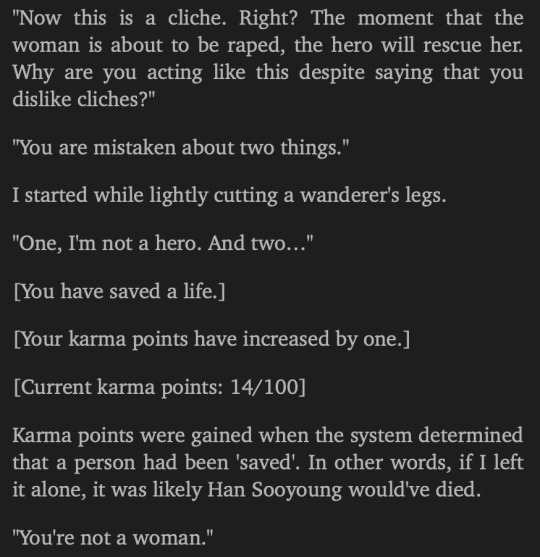
Kdj is not the Hero,
he's the Damsel.
Hsy is not the Damsel,
she's the Dragon.
#orv#han sooyoung#omniscient reader's viewpoint#hsy#omniscient reader's viewpoint novel spoilers#yoohankim#big utena vibes in this meta#just replace hero damsel and dragon#with prince princess and witch#also a bit of#kdj#and#yjh
55 notes
·
View notes
Text
Follow up to this post brought to you by @forgetme-eternally-blissfully, in fanfic snippet format because I gave up on drawing the comic (the fanfic was supposed to be a comic draft but I added too many details)
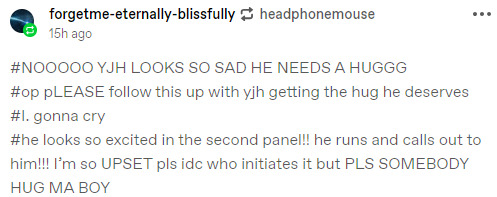
Kim Dokja lays on the ground among the rubble of a ruined building. He twitches a little before his eyes open. The world is blurry. In the distance, he can see a dark blur fluttering around his surroundings. As his vision comes into focus, he can recognize Yoo Joonghyuk searching through the debris.
A sharp pain coming from his side causes Kim Dokja to let out a groan as he struggles to push himself up to a sitting position. The sound catches Yoo Joonghyuk's attention and immediately he starts making a beeline in Kim Dokja's direction.
As Yoo Joonghyuk approaches, Kim Dokja takes note of Yoo Joonghyuk's tattered coat, his bloodstained body, the wounds on his face, hands, legs. None too serious though some deep enough to inevitably leave scars later.
Yoo Joonghyuk is getting closer, kneeling down, reaching his hand out towards Kim Dokja's face, making a move to pull Kim Dokja in when Kim Dokja decides to open his mouth.
"You're not losing your balance and having trouble standing are you? I'm not going to carry you on my back this time."
"Shut up," is all Yoo Joonghyuk says as he wraps his arms around Kim Dokja's shoulders. His grip is tight, one hand on the back of Kim Dokja's head, the other circled around his upper back.
There is a gash in Kim Dokja's side that throbs with pain. Blood loss has his head spinning and his vision blurring again. From where his face is pressed into Yoo Joonghyuk's shoulder, Kim Dokja can smell blood, sweat, smoke. Buildings continue to crumple in the background and the sound of something falling pitters in his ears. His hands tense and untense, relax and remain by his sides.
Kim Dokja lets out a breath and leans into Yoo Joonghyuk, just slightly. Just enough so that Yoo Joonghyuk can tighten his hold by a hair.
----------
Author's notes (what would normally be my image caption):
I said in the referenced post that Kim Dokja has no trouble reciprocating affection once someone else initiates, but I think Yoo Joonghyuk is the exception. Always exceptional, that one. At least during the Scenarios.
Kim Dokja can read his movements, see what Yoo Joonghyuk is aiming to do, can read his mind, dammit. But he can't comprehend his actions. Yoo Joonghyuk acting in a way that Kim Dokja doesn't know about is something that happens more and more often as time goes on, and serves as a reminder of the wall that exists between a protagonist and a reader, but also the wall that exists between two normal people. Because at this moment, Kim Dokja is still struggling to see Yoo Joonghyuk as his own person instead of a protagonist or a 1863x-regressor-to-be. He's blinded by what he knows and has seen in his own past, which he assumes will be Yoo Joonghyuk's future. When he looks at him, does he see those ghosts of the future flickering superimposed over the shape of the man before him? This is the sort of wall that exists between them.
So when Yoo Joonghyuk acts outside of Kim Dokja's expectations, Kim Dokja tries to push them back on course with banter. "Yoo Joonghyuk is getting closer, kneeling down, reaching his hand out towards Kim Dokja's face, making a move to pull Kim Dokja in-" Kim Dokja sees all of this, takes note of all of this, knows what's to come of it. Doesn't understand it one bit. He's not oblivious. It's more like, "Why? Why me? Why would someone feel this way about and want to do these things with me?" He KNOWS the effect he has on people. He intentionally calculates how much he interacts with Jung Heewon and Lee Hyunsung to ensure their loyalty towards him in the early scenarios (not so much so after like Scenario 5-ish so we're talking early-early scenarios. After that point he more supports them in the direction they want to go (when that direction is the direction he already wanted them to go anyways. something something picking teammates because he knew they were already loyal and righteous by nature, nurturing them so that they would be able to carry out their justice no matter the adversary. He chose them because he knew they were loyal and strong, but they weren't loyal or strong at the time. But they would be in the future. But they wouldn't have been without him. But in another time where he didn't exist they were strong anyways see this is how he is able to have ultimate faith in his party members and know the kind of support he has given them while still being unable to recognize his own value in the grand scheme of things. Because they would have been fine without him, he's SEEN it. This is another wall between him and other people, another future ghost)). So he knows how much influence he has in other peoples' lives. But he values himself so little that he is blind to the emotional, sentimental weight he has to these people. No matter how much he knows he's done for them, he won't see himself as worthy of genuine praise or recognition, affection, love.
So this lack of self recognition extends to his perception of all of his companions, but especially so to Yoo Joonghyuk. Yoo Joonghyuk is probably the person whom Kim Dokja is the most strict about characterization with. Kim Dokja knows him the best, it's true, but he also doesn't know a damn thing about him as a person instead of a character and that makes him feel a certain way. Vulnerable, I think. Lonely. That childish feeling of betrayal when the characters walk off the page without him. There are sides to people and characters that you will never know simply because they weren't observed. And there are sides of people that you have no right to know. It is by becoming a person instead of a reader that you must abide by those rules and give up omniscience. Part of being a person and recognizing another's personhood is to willingly not know everything about them.
Anyways. He's not there yet. Not by Hug Attempt #2. This was supposed to have 3 parts with the last one set after the epilogue but we'll see if I ever get to it.
#I AM A FOOL.#I thought posting the snippet would be easier for me but instead I ended up going on a long ramble in the author's notes.#so uh yeah enjoy your 300 words of fic and 700 words of meta#orv#omniscient reader's viewpoint#orv spoilers#writing tag#reading tag#btw. did u kno. did you know this whole 'kdj misses the hug cue' idea all began because. becaus e i missd a hug cue. again.#thats right#on several occasions people have t-posed at me and i just gave them the polite smile#they gotta be like 'im giving you a hug!' for me to get it#then i was like huh sounds like something kdj would do and i like bullying yjh
117 notes
·
View notes
Text
[orv major spoilers]
anyways we know that orv golden trio is reader, writer and protagonist. and youre thinking oh yeah kdj is the reader, hsy is the writer and yjh is the protagonist and yes youre right but also these titles and roles are transient and, as is in line with orv, characters do not simply remain predefined within the borders of their own boundaries
easiest and most obvious is kdj the reader into kdj the one who wanted to rewrite WOS's story and also into kdj the protagonist of orv. our dearest reader, writer and protagonist. he read a story, he dreamed and rewrote that story, and in doing so became the protagonist of his own.
but what about hsy? isnt she introduced as a writer and in the end also a writer? yes. and she read kdj's story to write his. she becomes his devoted reader, not only by his side during the 4 years of the scenarios, but also the 4 years she spends reading and writing his story. and i will argue she was one of the protagonists of the epilogue. she who was introduced as a villain and played the role of a "villainous" right until the final chapter. but, in line with the theme of change, she had then become the epilogue's protagonist. hsy and her writing process, it plays into the relationship between reader and writer, of the dialogue that becomes open between the words of another, the story of another and the transformative nature of story telling. if you reread orv with the lense thst hsy and kimcom and yjh are the ones writing down these words, you can understand how much love had shaped each letter. death of an author and all that but the author's words will always be a character own to itself.
and, in my opinion, most interesting of all is yjh. of course, he's introduced as the original protagonist of Ways of Survival. this grimly, tragic individual who could never move forward in time and stuck in the tragedy of an eternal hell. throughout the orv, you see kdj struggle with this relationship the most with yjh the regressor. but as you know, yjh eventually renounces his character and becomes the "yoo joonghyuk, ex-regressor". he had broken from the boundaries of the character and the story kdj had read to become his own person. this is important in his development espeically in the epilogue - yjh alone and barely surving and drifting through space with only the faintest wish and hope in a blinked out star. yjh, the former regressor, who doesnt know what to make of himself in a life without scenarios and a reader to watch over him, becomes a reader himself. he reads, reads and reads again to keep himself and his story alive in symbolic parellel to kdj using WOS to survive.

read and reread the novel. and when, he as one of orv's first reader, wanted to change the story's ending, well he became a writer too. although, we dont know the full extent of his editing but we do know that yjh probably did write some sections on his own, especially the ones from his perspective because there would probably be no way for hsy or anyone to extract and write his story, especislly when he was travelling through space.
reader, writer, protagonist - the lines between them are but a page turn away.
#orv spoiler#orv#yoohankim#sad yjh hours#orv meta#orv analysis#can you tell i did eng literature as a major
100 notes
·
View notes
Text




I went. A little bit ham on IG
822 notes
·
View notes
Text
ive got an sp/yjh saul/david paper sitting in my drafts id love to have finished in theory but i also dont have it in me to read through 1 samuel a sixth time so im just gonna drop the cleanest parts as is
ON THE VOYEURISM OF THE DIVINE
One of the keys to understanding Yoo Joonghyuk’s character is, simply put, the fact that he is a character. Yoo Joonghyuk (and by extension all iterations of him) is the ultimate unwitting exhibitionist—his entire life is not only on permanent display to the varying Constellations and reader(s) of both the in-text WOS and the metatextual ORV, it was created for such. While writing WOS, Han Sooyoung even goes so far as to say that “t(T)he life of 1863rd turn Yoo Joonghyuk was given to her in its entirety,” effectively establishing that his very existence is tethered to her desire to see him exist (Sing-shong 534). In the most literal of senses, he was made to be observed. In the glimpses of the original WOS we see in ORV, every moment of his struggles is catalogued in excruciating detail, detail that we then see Kim Dokja memorize and internalize and store for later use. As early as the starting chapters of the first volume, Kim Dokja uses his memories of Yoo Joonghyuk doing something as mundane as cooking in such precise detail that those around him immediately grow suspicious of the clarity of knowledge he seems to carry regarding their circumstances (Sing-shong 20). And even beyond the context of his origins, this idea of Yoo Joonghyuk’s creation for the purpose of observation carries over into the events of ORV as well. Kim Dokja already knows a frankly invasive amount about his Yoo Joonghyuk from the WOS readings, which is then compounded by his use of the Omniscient Reader’s Viewpoint stage 2 skill, a skill that lets him literally read Yoo Joonghyuk’s mind (Sing-shong 11). Kim Dokja even describes the sensation of receiving Yoo Joonghyuk’s thoughts as “like a waterfall in my (his) head,” which implies the reception of not only surface thoughts but rather every thought going through Yoo Joonghyuk’s head (Sing-shong 11). It’s an egregious overstepping of boundaries that he regularly uses for over half the novel.
But—and note the use of “his” Yoo Joonghyuk earlier—this knowledge of Yoo Joonghyuk doesn’t extend to every iteration of him. Kim Dokja only read WOS, so it would follow that the Yoo Joonghyuk he knows best is the Yoo Joonghyuk of WOS, or, in essence, a Yoo Joonghyuk who did not know Kim Dokja. A Yoo Joonghyuk who, as is revealed later in the novel, would then go on to become Secretive Plotter.
Secretive Plotter, therefore, as an extension of the Yoo Joonghyuk Kim Dokja knows best, is defined by his exposure. He is who he is because his life has been watched and recorded and analyzed and picked apart at all times, all the time—not just by Kim Dokja within the context of ORV, but even in the original WOS by the Constellations. He exists in this fixed state of victimization by a horde of voyeurs, and then even within ORV itself he still suffers from this constant observation. Although he remains a mysterious figure the readers (until his identity reveal at least) and Kim Dokja see obliquely for much of the narrative, he is far more obviously emotive than the 1864th Yoo Joonghyuk. The most obvious example of his comparatively vocal emotional outbursts is the infamous “Why, why is it not me but you??” scene (Sing-shong 446). While the scene (and that line in particular) is often read as Secretive Plotter expressing his jealousy towards Yoo Joonghyuk over his connection with Kim Dokja, the real signifier of his vulnerability is in Kim Dokja’s narration describing him a few paragraphs earlier. Kim Dokja says Secretive Plotter’s “tone of voice was heavy with grief. I couldn’t even fathom the depths of resentment contained within his words.” (Sing-shong 446). Compared to the layers upon layers of misdirection present in Kim Dokja’s narration everywhere else in the novel, the stark clarity of the description—the precise naming of the emotion(s) in Secretive Plotter’s tone—is startlingly obvious. 1864th Yoo Joonghyuk sits on the opposite end of this (admittedly somewhat narrow) spectrum. In the Epilogues, after the events of the 1865th round and the retrieval of the Kim Dokja of that round, we see (through the third person narration of Yoo Sangah) Yoo Joonghyuk’s reaction to the problem with their freshly-retrieved Kim Dokja. This scene, in which Yoo Joonghyuk’s expression is described as “frozen pale-white…as if he had lost a protective wall of his mind, he seemed to be muttering something to himself…” and while this is certainly an evocative image being painted for the reader (especially when factoring in Yoo Sangah’s later allusion to his expression during Kim Dokja’s erasure from the Star Stream in the 73rd Demon Realm), we still have virtually no idea what he’s actually feeling or thinking in this moment (Sing-shong 540). Even at what is arguably one of his lowest moments, 1864th Yoo Joonghyuk’s emotions are hidden from the reader—we can extrapolate, we can deduce and surmise and conjecture the broad strokes of his thoughts in the moment, but we ultimately do not know. Secretive Plotter is palpably unobscured in comparison: he is pinned open and dissected like a bug in a petri dish even when he has the objective upper hand. All the power in the world means nothing for the Secretive Plotter because he is always, always at the mercy of those watching him use it.
However, the lack of exposure seen in the 1864th Yoo Joonghyuk in the Epilogues could be explained away by it being under Yoo Sangah’s narration, not Kim Dokja’s. Yoo Sangah does not have anywhere near the history of obsession and observation with Yoo Joonghyuk’s life and thoughts that Kim Dokja has/had (regardless of her having read WOS while inside the Fourth Wall), so it would stand that of course her narration of Yoo Joonghyuk would lack the highly scrutinizing quality that the rest of the text of ORV seems to take. Now, initially, this is true. As said before, Kim Dokja possesses the Omniscient Reader’s Viewpoint skill(s) and he uses them with reckless abandon all throughout ORV. So, while metatextually the 1864th Yoo Joonghyuk is largely hidden from the reader’s view, in the actual text we see his thoughts on display with alarming frequency entirely due to Kim Dokja’s actions. What makes him different from Secretive Plotter in this instance, then? Secretive Plotter is exposed via ORV the novel and the 1864th Yoo Joonghyuk is exposed via ORV the skill—the difference would only lie in medium here, so what truly separates the two? The answer lies in the battle(s) against Yoo Joonghyuk’s companions from the 999th round. Towards the end of the arc, during a lull in the fighting, 1864th Yoo Joonghyuk asks Kim Dokja to use Omniscient Reader’s Viewpoint stage 3 on him (in order to better integrate the story ‘Hell of Eternity’), but Kim Dokja is reluctant to do so. After some introspection (in which he realizes he’s been building his relationships off of his understanding of people from reading their minds), he tries to read Yoo Joonghyuk once more with ‘Hell of Eternity,’ but instead of basing his “reading” off of his memories of WOS or the assumptions he’s built around the 1864th Yoo Joonghyuk from them Kim Dokja clears his mind and thinks of him as a stranger—as a person he does not know (Sing-shong 467). As soon as he does so, as soon as he respects Yoo Joonghyuk not as a powerful character in a story or as an integral fixture of his life, Yoo Joonghyuk ceases to be a character. When he chooses to respect Yoo Joonghyuk as a person, Yoo Joonghyuk is able to escape the voyeurism intrinsic to their initial relationship.
And this is the core of the divergence between Secretive Plotter and the 1864th Yoo Joonghyuk: Secretive Plotter never experiences that release from two-dimensionality but Yoo Joonghyuk does. Secretive Plotter remains a figure used in the plot, by the plot, and for the plot (what is ‘Hell of Eternity’ itself if not the amalgamation of Secretive Plotter’s functionality in the narrative wrapped in a story-shaped bow), but after his christening as a fully fleshed person in the 999’s arc, the 1864th Yoo Joonghyuk is able to finally grow beyond his origins and into a person with control over his life and story. Taking that moment (and the fact that Kim Dokja is, functionally, the capital-G God of the ORV/WOS world) it then evolves to mean that the 1864th Yoo Joonghyuk was saved from the emotional violence of his relationship with his god by the reciprocity of the relationship with that god. When their relationship developed to that of equals, his god was able to respect him as an individual.
Now. In the Saul and David narrative (limited to 1 Samuel), we see a remarkably similar dynamic play out. Saul, the first king of Israel, is something of a unique figure even within the actual text of the Bible. The historical sections of the book lend themselves to much obfuscation of detail, more often than not only informing the reader of the bare bones necessary to put together what happened and why it matters in defining how the reader should go about their relationship with God instead of spending time dwelling on characters for the sake of the development of the characters themselves. It is very rare that extraneous information regarding motivations or precise methods or even just an individual's thoughts are exposed to the reader. This is not the case with Saul. All throughout 1 Samuel, Saul’s thoughts are very, very openly exposed. Cohen's study of the book goes so far as to describe his mind as being studied "as if it is an exhibit in a display case." Rather than giving the reader only his direct quotes or physical reactions to things, the book tends to directly state his thoughts. When the people of Israel praise David for his contributions by downplaying Saul’s, the text does not describe him as brooding in silence or disdain, but rather reveals precisely what he is thinking to the audience—"They have ascribed unto David ten thousands, and to me they have ascribed but thousands; and all he lacks is the kingdom!"
Going back to Secretive Plotter. Saul and Secretive Plotter were both powerful beings beloved by their gods and were both put under intense, invasive scrutiny by them in their narratives. Saul’s inner thoughts are constantly on display to the reader and Secretive Plotter’s entire life was transcribed for Kim Dokja to read. Even at the end of the novel Secretive Plotter’s “◾◾” is revealed to the reader while Yoo Joonghyuk’s is not. Saul and Secretive Plotter would then both go on to be replaced by another individual also chosen by god and also beloved by god, only changed by their respective gods' decision to reserve their scrutiny.
In comparison, David remains the paragon of obscurity. Like most other Biblical protagonists, David’s thoughts are rarely, if ever, seen by the reader. In the varying scenes in which Saul becomes increasingly more distressed and threatened by David's existence we continue to see the dissolution of Saul’s mental state and psyche but next to nothing on David’s part. From the moment of his selection by God in his father's home to the end of 1 Samuel and his coronation as king of Israel, David's thoughts remain wholly inscrutable to the reader unless he decides to vocalize them. All expressions of David are instigated by him and for him—the reader does not see his mind unless he wants the reader to see it.
It is clear, then, that in the Saul and David dynamic, the key difference between them is the depth and, like Secretive Plotter and Yoo Joonghyuk, the reciprocity of their relationships with their gods. Saul often blunders and mistranslates the will of God, being regularly rebuked by Samuel (a prophet of God) for his mistakes and being very, very rarely (if at all) praised for any successes resulting from his efforts. Saul clearly desires a connection with God—he seeks out Samuel for counsel often and even reneges on one of his own laws by hiring a medium to commune with him after his death—but that connection is never reciprocated. God openly states that he is choosing to turn away from Saul and that he regrets having chosen him as king. Secretive Plotter attempts to form a Sponsorship Contract with Kim Dokja in the first 5 chapters of ORV and even after his refusal continues to follow his progress throughout the scenarios. He brings Kim Dokja to the 1863rd round and attempts to force him to see his perspective and even kidnaps him and brings him into the NGai Forest—culminating again in the “Why, why is it him and not me?" scene, but Kim Dokja never returns his attempts at any level of depth and is actually quite disturbed and frightened by them.
With David and Yoo Joonghyuk, their relationships with their gods are much more intense and most importantly, mutual. David is often described with the epithet "a man after God's own heart" and despite his frequent missteps outside the bounds of the will of God, remains in God’s favor. He desires connection with God, as seen in the many psalms he wrote and his frequent counsel with various prophets, and he very clearly receives it. Yoo Joonghyuk desires connection with Kim Dokja, which is the reason the whole WOS reveal guts him as badly as it does. He extends his hand out to Kim Dokja frequently, and although it may take Kim Dokja time to recognize it for what it is, he does come to accept it and reciprocates his affections.
It goes to show then, that the key missing with Saul and Secretive Plotter that their successors possess is not in skill, is not in power or in physical trait, but rather in that their gods were able to view them as individuals and respect them enough to not pick them apart for answers and instead just ask the questions themselves.
#there were originally like 4 sections to this paper#if i ever find it in me to clean those up too ill drop em as additions to this post but otherwise thats it from here babes#orv meta#omniscient reader#omniscient readers viewpoint#orv#yjh#yoo joonghyuk#kdj#kim dokja#secretive plotter#orv spoilers#omniscient reader spoilers#orv epilogue spoilers#bard writes
24 notes
·
View notes
Text
– In a world where the scenarios have come to an end, what should he do to continue living on?
That's right. That's what he wanted to ask Kim Dokja. Because that guy knew everything.
Kim Dokja, always thinking about the end. The man who planned for everything, and didn't hesitate to sacrifice his own life to see the conclusion of a certain story.
A fool like that should know, he thought.
If it was Kim Dokja, then he should know more about Yoo Joonghyuk than Yoo Joonghyuk knew about himself. That's what the latter thought.
The regressor who stopped regressing – just what would become of him?
Lee Jihye said that she suffered from nightmares every night.
But for him, his life had been a constant nightmare for the longest time. The only reason why he managed to endure until now was because he still had a goal, an aim, which he hadn't achieved yet. However, that goal was now no more, and the scenario had ended, as well.
The regressor Yoo Joonghyuk was free.
But as he stood before the hard-earned freedom, he couldn't figure out what exactly he had finally earned.
Joonghyuk needing to find Dokja so he can tell him what to do. 😭😭😭
Oh man, we've seen him slowly soften throughout the entire novel, losing his hard edges and his lightning-fast "just kill everything that bothers me" and while that's good for his humanity, it's also resulted in so many moments where he just seems so lost and now he's literally lost, drifting through space, and he just wants his companion back because Dokja always has all the answers, especially the answers in regards to him.
Oh man, and the fact that his creator was right there but he doesn't want to ask her, oh no. She may have created him, but she's not the one who understands him. She's not the one who loves him. She's not the one who read through every single chapter of his story and thought there was nothing greater to be found in life.
Oh man, and the similarities with Dokja's own journey as Oldest Dream. While Dokja drifted along the train and slowly lost bits and pieces of himself and his memories, Joonghyuk is drifting through space losing bits and pieces of himself and his memories. 😭
Actually, I think Sooyoung had moments like this too while writing TWSA while in her younger self's body, iirc. Meaning all three of them have sort of given up bits and pieces of themselves as part of this process - Sooyoung gave part of herself to the work as she wrote it, Dokja gave part of himself to the work as he read it, and of course Joonghyuk is the living embodiment of TWSA and we all know what he's given to it. And now the process starts over with Joonghyuk giving up part of himself as he attempts to deliver a new story to the reader.
#orv novel chapter 548#orv spoilers#orv epilogue spoilers#omniscient reader's viewpoint#orv#orv liveblog#yjh#if you'd told me that a story that started out with yjh dropping dokja off a bridge#would end with yjh as a weird story-powered astronaut drifting through space on a journey to deliver ORV itself to dokja...#like man I know this novel is 551 chapters so that's a LOT of room to grow but man it started off as an isekai-adjacent action comedy#and then just hit you with all THE FEELINGS and thought-provoking meta and SYMBOLISM the instant your guard was down
25 notes
·
View notes
Text
Going through the climax of the arc that made me fall in love with ORV is something special, so of course, I had to write a small meta. Keeping everything vague so that there are no novel spoilers <3
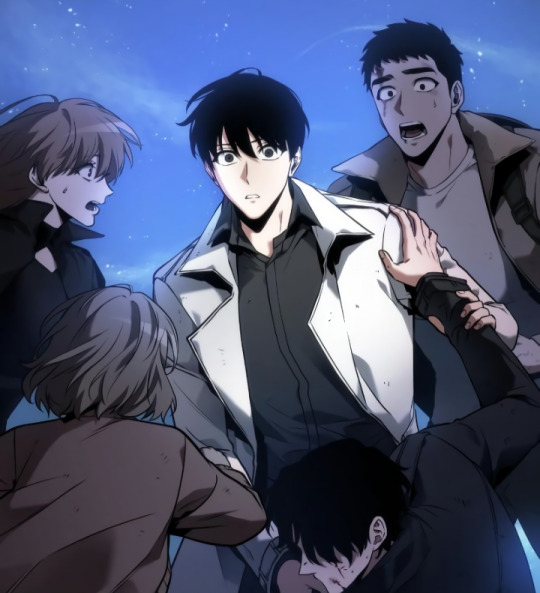
When Dokja revives, everyone (who can stand) immediately flocks to him. They surround him with worried looks and outstretched arms. Even Joonghyuk is holding on still. They're all focused on him, he's obviously the center with how the lighting is, but it means more. He cares about something that they don't.

And that's future Shin Yoosung. None of them have a reason to care about the woman that's been trying to kill them. And Yoo Joonghyuk has no knowledge of the 41st turn yet, so he doesn't either. But Dokja does. He knows her suffering, her story.
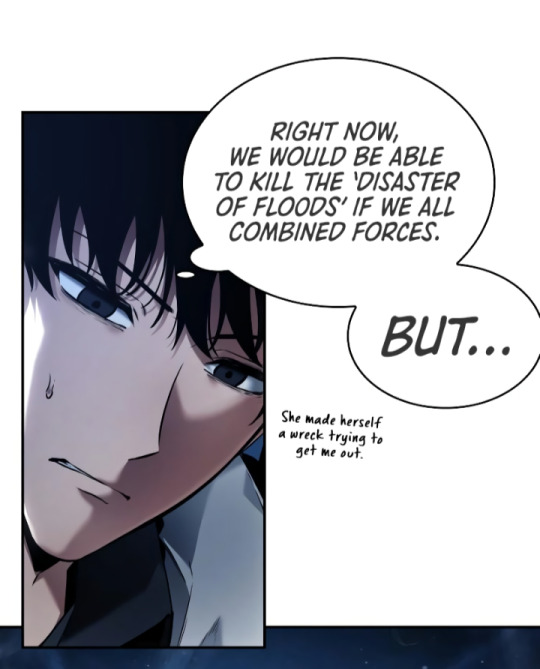
He knows that the smartest and easiest thing to do right now would be to kill her, but...
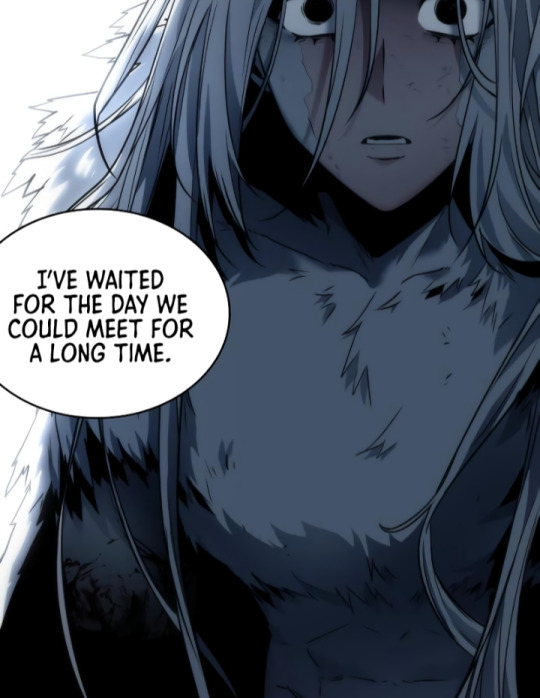
He loves her. And no, not in a way that he loves Joonghyuk (im sorry I had to), but the way that he loves all of the story. He loves that story that saved him and kept him afloat all these years along with every character in it. Especially such a tragic one like Shin Yoosung. He even felt her grief and anger first hand a few minutes ago when he shared her body. As the story continues, we see this again and again - Dokja's bleeding heart.
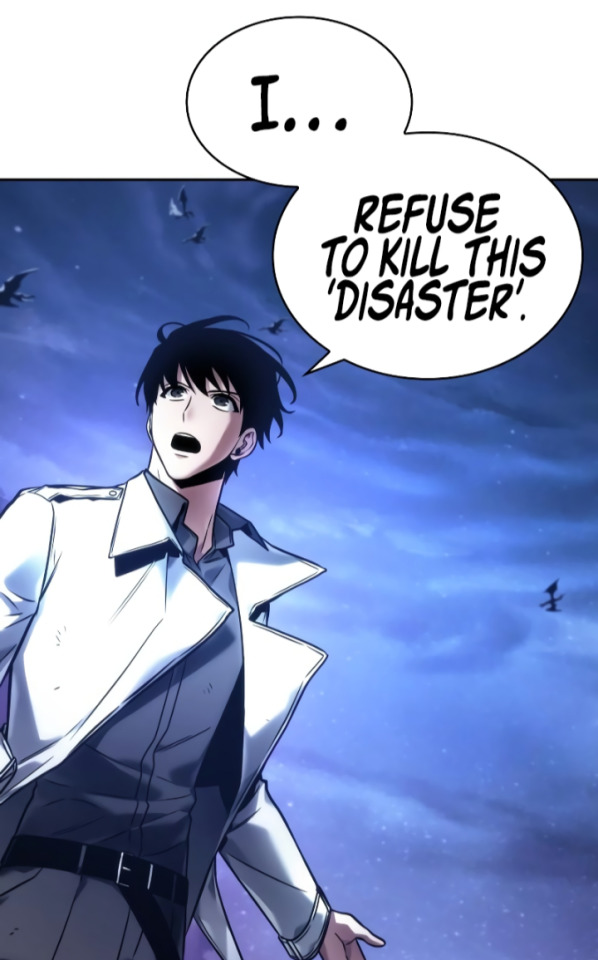

He can't abandon her, he won't. He refuses. And SYS is rightfully confused. Who is this man that she just learned of? Who she just killed and is now refusing to seek revenge. Who makes her heart ache even though she doesn't know why
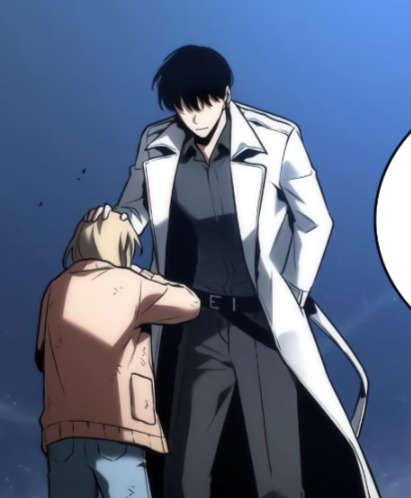
This is why. She was able to feel all the love poured into and out of current SYS thanks to the memories that they briefly shared. The effect is amplified due to their sponsor & incarnation relationship. It aches because she was unable to feel that love from the one she wanted to the most in the 41st regression

And she's angry still. It's just another reminder that it was something she never had, and now the people she loved are the same but different. They aren't hers

Then she realizes that there is indeed someone who can relate. And you can see on his face that he doesn't blame her. He gets it, more than anyone. Even though she just killed Kim Dokja, his precious companion, right in front of him, he isn't angry. Dokja is fine, and SYS was also one of his precious companions, so he is happy to lend leniency
#part 2 shortly! the image limit caught up to me#this is only partly meta - more observation#idc tho i like disecting it since its such a precious arc for me#not every yjh#orv#omniscient readers viewpoint#yoo joonghyuk#shin yoosung#kim dokja#orv meta
258 notes
·
View notes
Note
i hope u dont mind the ask bc ur tags opened more cans of worms and i cannot reblog this one post 50 times kdjfhgkdhg

this close,,,,,,, god,,,,,,,,,,,, on reread the Enemy of the Story arc hits so much fucking worse because that was the time he WANTED to live and that too he wanted to live with THEM, he wanted an ending where everyone was happy and alive and he could finally picture himself there too. he could've sacrificed himself all over again but this time he actually tried,,, even collaborated with yjh,,, he TRIED,,, he was ready to go to the epilogue TOGETHER
but then the subway doors opened and he saw a young boy sitting on a bench......... and he couldn't forgive him. all that progress shattered because the guilt drove him insane,,, he could've found a compromise w the fourth wall, maybe. there were other options. but he didnt want the other options. he wanted to atone. OUGHHHH MY CATHOLIC GUILT-RIDDEN BABYGIRL
"MY CATHOLIC GUILT-RIDDEN BABY GIRL" why is this one of the most accurate statements ever made about kdj
AND YOU GET IT. YOU GET IT.
he wanted to live,, he forgave himself (kinda. as much as he can.) but he just couldn't forgive the boy on the bench. he was LITERALLY confronted with his inner child and wanted to kill him im
FUCK i just. ough.
he forgave a part of him. but he couldn't forgive himself, entirely. wait shit is this why he goddamn split im going to give myself a concussion
look im high on caffeine and its 4am. my brain is just turned into mush that occasionally begins breaking out in sobs when presented with kim dokja. however if his fuckin inability to forgive all parts of himself is the reason why he split himself im going to jump out of a window /j
#orv#im so tired#however i will negate my tiredness to strangle kdj into therapy#yes there's a reason why i chose yjh in the best friend poll /hj. i chose him because i think hes a little silly guy :]#orv meta#kim dokja#could a depressed person do THIS
94 notes
·
View notes
Text
Lovecraftian Influence in ORV (part 2):
Disclaimer: idk if all the parallels are intentional; I'm not an expert on Lovecraft; this is defo not going to contain all the stuff in detail or even all the stuff coz like I said, I ain't an expert
1. Textual parallels:
Both ORV & Lovecraftian lore emphasize the cyclical nature of time and existence. In ORV, Dokja's regressions and the ever-repeating scenarios of "Ways of Survival" mirror the cyclical dreams of Azathoth. Similarly, Lovecraft's stories often feature ancient entities trapped in endless cycles of slumber and awakening.
The motif of uncaring gods and the dangers of seeking ultimate knowledge is central to both Lovecraftian mythos and ORV.
The most merciful thing in the world, I think, is the inability of the human mind to correlate all its contents. We live on a placid island of ignorance in the midst of black seas of infinity, and it was not meant that we should voyage far.
- H.P. Lovecraft
In the mythos, Yog-Sothoth embodies the totality of time and space, existing outside our linear perception. It has the ability to manipulate time in non-linear ways, creating alternate realities and diverging timelines. Imagine a tapestry of time, and Yog-Sothoth meticulously snipping sections and reconnecting them in impossible geometries, birthing new worlds and realities into existence.
Similar is ORV's "square circle". Imagine a perfect circle, representing a closed timeline, yet simultaneously containing its own square corners, moments of choice and potential divergence.
Crawling Chaos(one of the names of Nyarlathotep) is directly mentioned in ORV: (look at the phrasing- myths that were prototype of Ways of Survival)
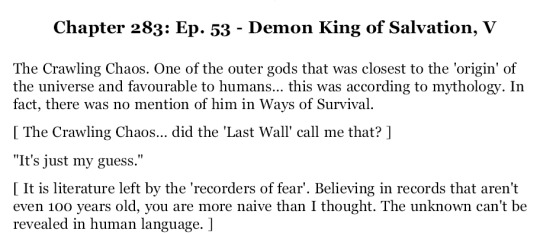
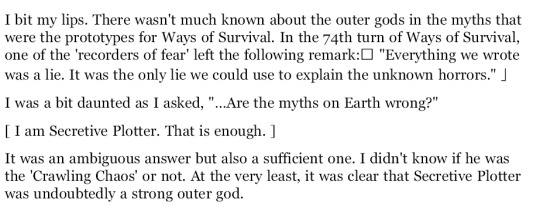
Character parallels:
Most Ancient Dream & Azathoth: This one's a no-brainer.
Both are dreaming entities who shape reality without conscious intent- while Azathoth is a blind god who's unconsciously dreaming up the universe & MAD is a traumatized child who's dreaming up stories as a coping mechanism.
The "idiot god" aspect of Azathoth resonates with MAD too. Both are unaware or atleast have a lack of choice/control. Their dreams & reality itself are in a continuous loop
The "uncaring god" aspect of Azathoth resonates with the MAD's desire for new stories rather than any sense of morality or concern for its creations.
2. Nyarlathotep & Secretive Plotter:
Nyarlathotep is said to be the puppet/avatar of Azathoth while YJH/Secretive Plotter is labeled as the puppet of MAD.
Worldline Jumpers
All black ensemble (silly comparison ik)
Mocking contempt for their "masters"
Nyarlathotep views humanity as playthings, pawns in his game. He's often described as a harbinger of apocalypse, acts on an enigmatic agenda seemingly tied to chaos and destruction. While Secretive Plotter's goal was to meet-kill MAD & end the cycle of regressions once & for all through an apocalypse.
3. The Hounds of Tindalos:
The Hounds of Tindalos are creatures created by Frank Belknap Long and later incorporated into the Cthulhu Mythos. Both the names of Hounds of Tindalos & Hounds Chasing After the Abyss have been mentioned in the text. So, it's a direct reference.




4. Yog-Sothoth the gatekeeper & Fourth Wall+Dokkaebi King
5. Shub-Niggurath & tls123/1863hsy:
disclaimer: Lovecraft's work is unfortunately riddled with racist and xenophobic imagery and tropes, particularly regarding Shub-Niggurath.
Shub-Niggurath is said to be the "Mother of All Gods" & we can compare tls123 to her in the same vein as tls123 is the author of TWSA while 1864hsy is the author(or co-author) of ORV. "tls" represents the Korean word for "god" as the keys for T, L, and S correspond to the letters ㅅ, ㅣ, and ㄴ on the Korean keyboard. => tls123 is the author-god of the universe
(tls123 is also kinda similar to Azathoth in having no power over their creations)
6. Randolph Carter & the 0th YJH: Randolph Carter is a recurring character in many stories from Lovecraft's Dream Cycle series. He also features in an unfinished short story called "Azathoth". In Azathoth, Randalph travels through space and time in his dream-form, and is drawn to the nighted throne of the far daemon-sultan Azathoth, the blind idiot god who rules over chaos and creation.
Like, Randalph, 0th YJH chooses to regress because he wants to meet MAD
...and that's it for now. I'll add more if I remember. Constructive feedback is welcome but keep in mind: I'm no expert & also a human behind the keyboard.
#tumbler of misc whisperings#areadersuncertaintyprinciple#hp lovecraft#cthulhu mythos#orv#orv spoilers#meta analysis#orv meta#lovecrafian#randolph carter#yjh#hsy#kdj#most ancient dream#singshong#yog sothoth#nyarlathotep#azathoth#shub niggurath#hounds of tindalos#crawling chaos#han sooyoung#kim dokja#yoo joonghyuk#secretive plotter#orv omniscient reader's view point#omniscient reader#omniscient reader spoilers#omniscient reader's viewpoint
14 notes
·
View notes